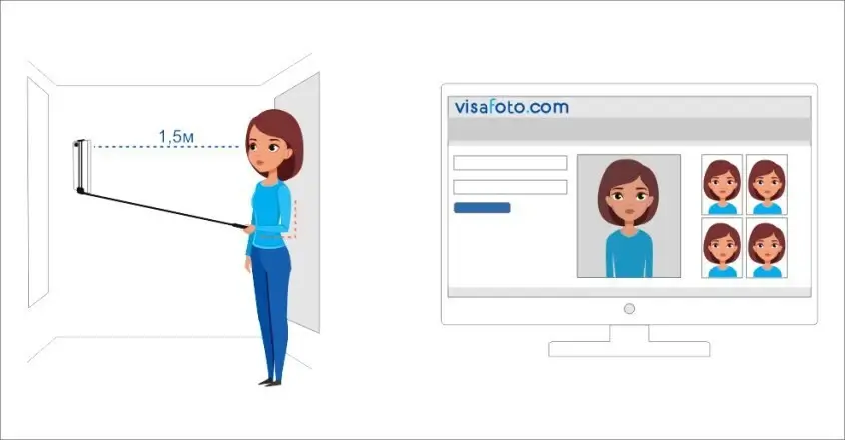Spain’s Retirement Visa: A Complete Guide to the Non-Lucrative Visa Scheme
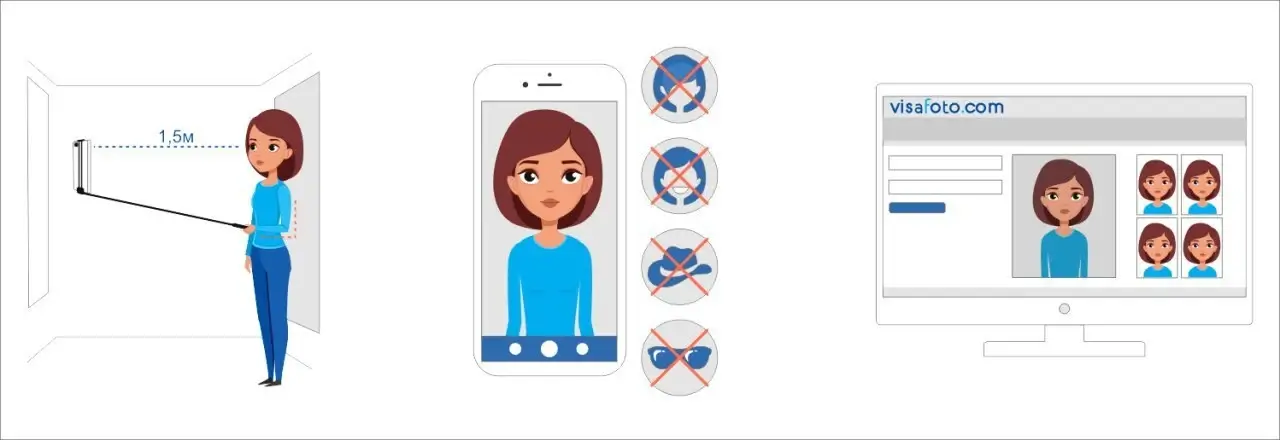
The Non-Lucrative Visa in Spain is a popular choice for retirees and others who want to live in Spain without working. It allows you to travel within the Schengen area and gives you access to Spain's healthcare and education systems. But, how much money do you need for a retirement visa in Spain?
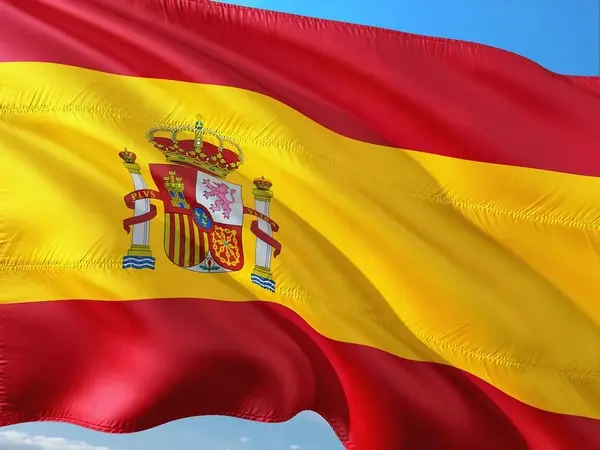
Keep reading to find out how to retire in Spain from Canada, the USA, or any other non-EU country.
Table of contents
- Does Spain offer a retirement visa? Non-Lucrative visa scheme explained
- Who is eligible to get a Non-Lucrative Retirement visa for Spain?
- Rules of retirement in Spain: taxes, restrictions and obligations
- Spanish Non-Lucrative visa application process
- Documents required for Non-Lucrative visa application
- Spanish visa photo requirements
- Get a Spanish visa and ID photo online
- Spanish visa photo app
- Spanish Non-Lucrative visa fees
- Non-Lucrative visa processing time
- Non-Lucrative visa renewal
Does Spain offer a retirement visa? Non-Lucrative visa scheme explained
What is a Spanish Non-Lucrative visa? — The Non-Lucrative Visa in Spain (Visado de Residencia No Lucrativa) is for people from outside the EU who want to live in Spain without working. It's great for retirees or anyone with enough passive income to support themselves while enjoying a long stay in Spain.
With a Non-Lucrative Visa, after 5 years in Spain, you become eligible to apply for permanent residency. After ten years, you could apply to become a Spanish citizen.
This visa allows family members (like your spouse and dependent children) to join you. However, you'll need to show more income if they come with you.
Retiring in Spain after Brexit is still possible for UK citizens, but it involves navigating residency requirements that apply to non-EU nationals.
Can US citizens retire to Spain? — Yes, US citizens can retire to Spain, but Medicare won't cover your health costs abroad. You will need to get private health insurance to handle medical expenses while living there.
Who is eligible to get a Non-Lucrative Retirement visa for Spain?
To qualify for this Retirement Visa, applicants must meet certain Spain Non-Lucrative visa rules. Here’s a rundown of what's needed:
Non-EU citizenship
Only people who are not citizens of the European Union (EU) can apply. If you're from an EU country, you don't need this visa to live in Spain.
Financial stability
How much income do I need to retire to Spain? — As of 2024, you must show an income greater than 400% of the IPREM (Public Multiple Effects Income Indicator), which is about €28,800 a year or around €2,400 each month for the main applicant.
If you’re bringing family members, you need to add an extra 100% of the IPREM for each person. This is approximately €600 more per month per family member.
No work in Spain
You can't work or run a business in Spain on this visa. It's for those who can live off passive income, like pensions, savings, or investments.
Clean criminal record
You need to show proof that you don’t have a criminal record. This means getting a police clearance from your home country and any other places you’ve lived for over six months in the last five years.
Health insurance
You must have private health insurance from a company that operates in Spain. This insurance should cover all medical costs and not require co-payments.
Medical certificate
You’ll need a medical certificate confirming you don’t have any diseases that could threaten public health.
Accommodation proof
Show that you have a place to live in Spain. This can be a lease or ownership documents for a house or apartment.
Rules of retirement in Spain: taxes, restrictions and obligations
With a Spain Non-Lucrative Visa, you'll become a tax resident if you live in Spain for more than 183 days a year. The tax on Non-Lucrative Visa depends on your worldwide income. Income tax for EU residents starts at 19%, and for non-EU residents, it starts at 24%. Different income types might have other Spain retirement visa tax rates:
- 19% for income up to €6,000.
- 21% on income between €6,001 and €50,000.
- 23% on income between €50,001 and €200,000.
- Higher rates apply to incomes above these thresholds.
As a tax resident, you must file an annual tax return declaring your entire income and assets. Not doing this can result in penalties.
The main limitation of the Non-Lucrative Visa is that you can't work or do any business activity in Spain, including both jobs and self-employment.
Spanish Non-Lucrative visa application process
How to get a retirement visa in Spain? — Applying for a Non-Lucrative Visa in Spain is straightforward, but you need to be thorough. Here’s a simple guide to help you through the process:
- Get in touch with the nearest Spanish consulate or embassy to book an appointment. It's a good idea to do this early, since slots can fill up quickly.
- When you go to your appointment, you will need to:
- Submit your application form and supporting documents.
- Provide biometric data, which includes fingerprints and a photo.
- Pay the application fee.
- Wait for approval. Processing times can vary, but generally range from two to five weeks. In some cases, it might take up to three months.
- If your visa is approved, you’ll get your Non-Lucrative Visa, which lets you live in Spain for one year initially. You can renew it for another two years if you meet the renewal conditions.
- Once you arrive in Spain, make sure to apply for a residence card within 90 days.
Documents required for Non-Lucrative visa application
Make sure to gather the following documents for your visa application:
- Filled out and signed application form.
- Your valid passport, plus a photocopy.
- A recent photo that meets the specifications.
- Proof of financial means. The detailed list of appropriate documents is described in the article below.
- Provide proof of private health insurance that covers you in Spain.
- Criminal record certificate. Obtain this from your home country and any other countries where you’ve lived for more than six months in the last five years.
- Medical certificate. This should confirm that you don’t have any diseases posing a public health risk.
- Proof of residence. Show that you live in the consular district (e.g., a utility bill or lease agreement).
- Proof that you've paid the visa application fee.
What financial documents do I need for Spain's Non-Lucrative Visa?
- Provide bank statements from the last 6 to 12 months. These should show a steady income or balance, proving you have enough money. Make sure the statements aren't older than six months when you apply.
- Showing your Spain Non-Lucrative Visa savings through account statements helps prove you have adequate financial resources to qualify.
- If you depend on a pension, provide official documents that confirm your pension payments, showing a regular monthly income.
- You can present evidence of investments like property, stocks, or bonds. These documents should show the value and stability of the investments and any income they generate.
- Show any other income sources, such as rental income or dividends from investments. The documentation should clearly show how much money you receive and how often.
- If necessary, include documentation showing that you're financially independent of family members or partners who may also be supporting you.
Spanish visa photo requirements
When applying for a Spanish visa, your photo must meet these requirements:
- The photo size should be 3.5 × 4.5 cm (35×45 mm).
- The head should be about 3.5 centimeters tall (between 31.5 mm to 3.6 cm).
- The photo must be in color.
- The background must be plain white.
- The photo should be taken within the last six months.
- Your face should be centered.
- The photo must show your full face.
- You should be looking directly at the camera.
- Both your hair and face should be visible, and your ears should be shown.
Here's an example of what a Spanish visa photo should look like:
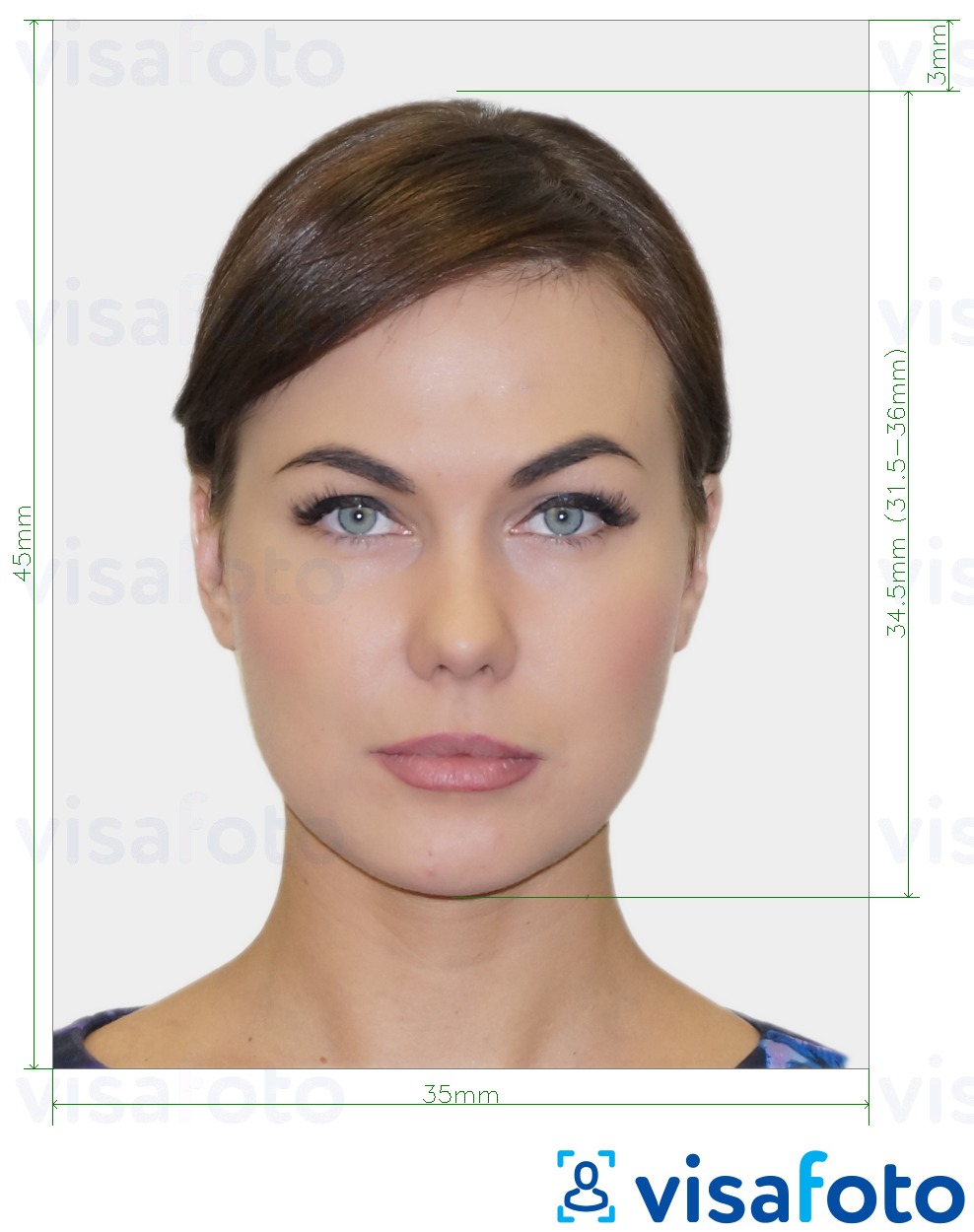
Get a Spanish visa and ID photo online
To save time and money on your Spanish visa application, use an online photo service like Visafoto. It lets you get a professional-quality photo without going to a photo studio.
Just take your picture following the guidelines and upload it. Visafoto will handle the details like size, format, and background. Since 2013, Visafoto has been preparing photos for passports, visas, driving licenses, and more globally.
You'll receive both a digital version for online submissions and a print-ready format. If you’re unsatisfied with the result, we offer free replacements. If your photo is denied by officials, a full refund is guaranteed.
It should look like this:
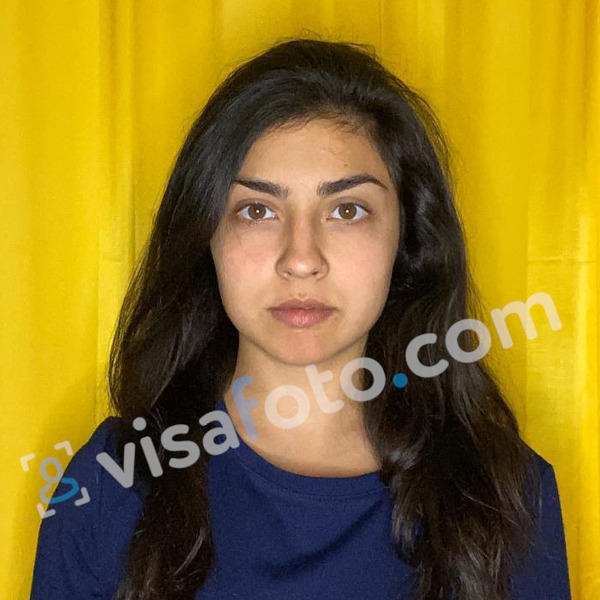
You will get two types of photos: a digital one for electronic submission and a template for printing.
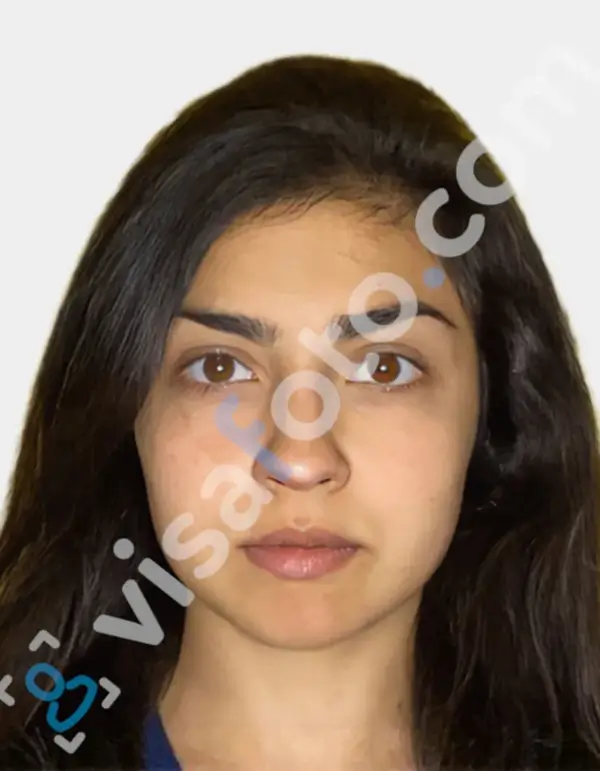
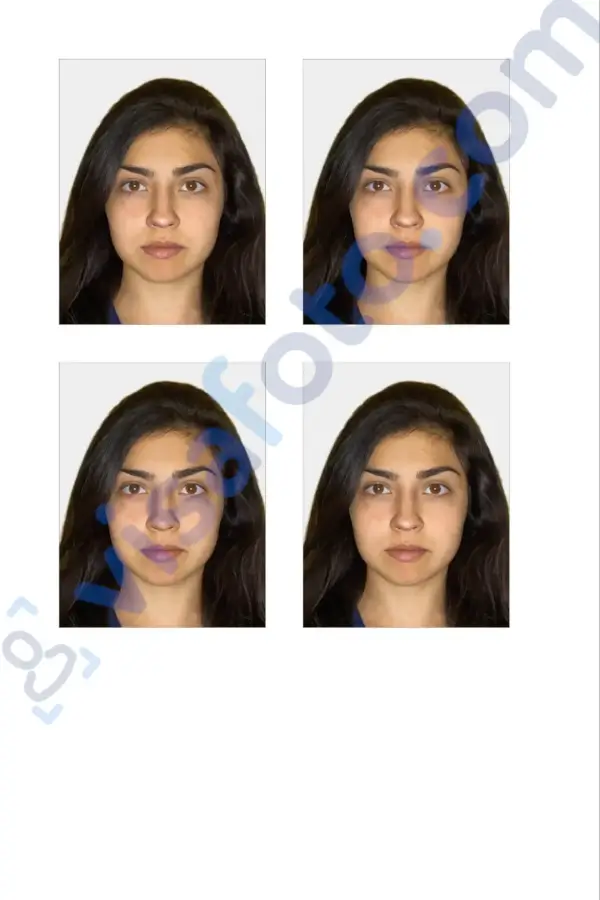
Spanish visa photo app
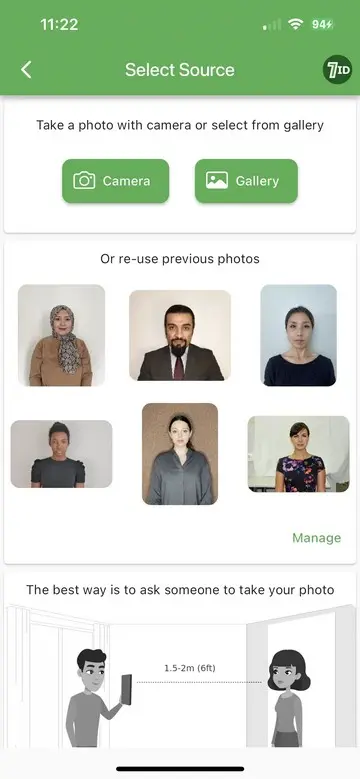
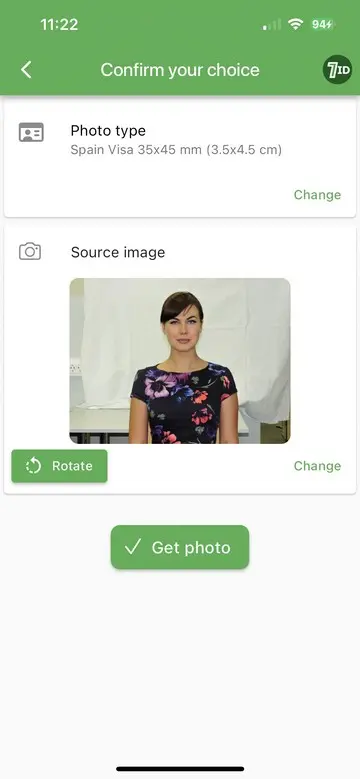
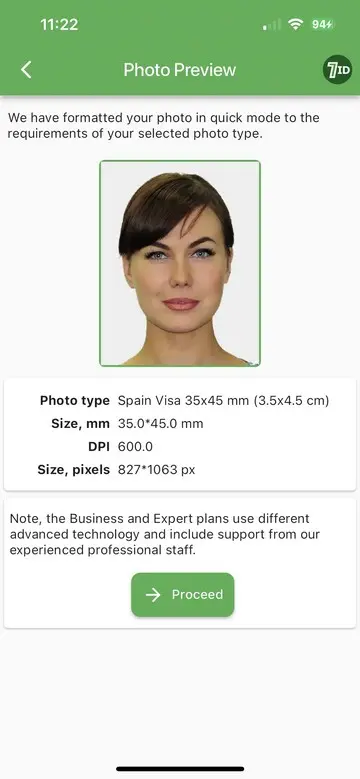
Check out the 7ID App by Visafoto.com for creating ID, passport, and visa photos right from your phone. It's available on iPhone and Android.
Using 7ID is easy: upload your photo, choose your document type and country, and the app will automatically size and format it to meet official standards, including the proper background and face position.
You will get a digital version and a print template that fits common paper sizes like 4×6, A4, A5, or B5. We provide 24/7 support to assist you.
Spanish Non-Lucrative visa fees
The cost of applying for a Spanish Non-Lucrative Visa can vary based on your nationality and the consulate you use. Typically, the application fee is around €140 for most applicants, covering the residence visa authorization. Additional service fees may apply if a visa center is involved.
Country-specific fees:
- United States: About $152 (approximately €140), including the authorization fee.
- United Kingdom: About £516 plus a processing fee of £9.45.
- Canada: Around €507.
- Other Countries: Fees generally range from €80 to €140, based on reciprocal agreements.
Non-Lucrative visa processing time
Usually, you can expect a decision on your Non-Lucrative visa application within 2 to 5 weeks after submitting it at the consulate. However, if the consulate is busy with many applications, it might take up to 3 months. Other factors, like requests for extra documents or interviews, can also extend the processing time.
Once your visa is approved, you have one month to pick it up from the consulate.
Non-Lucrative visa renewal
The Non-Lucrative visa is initially valid for one year. You can renew it twice, for two years each time. To be eligible for renewal, you must spend at least 183 days in Spain each year.
You can apply for the first renewal 60 days before your visa expires or up to 90 days after it has expired. This same timeline applies for your second renewal, which takes place after two years. You can renew up to three times, allowing you to stay for a total of five years before applying for permanent residency.
Here’s how to renew your visa and what you’ll need:
- Book a time at your local immigration office to hand in your documents. If you have a digital signature and a Foreigner's Identification Number (NIE), you can apply online via the Spanish Central Electronic Office (Sede Electrónica).
- Collect Required Documents:
- Complete and turn in two copies of Form EX-01 for renewal.
- Have the Fee Form 790-052 filled, paid, and stamped.
- Your passport should be valid for at least another year.
- Photocopy all pages of your passport.
- Include your current Tarjeta de Identidad de Extranjeros (TIE).
- Show proof of health insurance that matches Spanish requirements, offering comprehensive coverage without co-payments.
- Prove you have enough income for the next two years, which is typically more than 400% of the IPREM (Public Multiple Effects Income Indicator) for you, plus extra for any dependents.
- Present a recent proof of address in Spain (padrón) that's less than three months old.
- Confirm there are no outstanding debts with the Spanish Tax Agency or Social Security.
- Provide a clean criminal record, ensuring no legal issues in Spain.
- Submit your application.
- Pay the associated fees.
- Await approval. The authorities have up to three months to decide. If they don't respond within this time, your renewal is automatically accepted through what is known as administrative silence.
- Once approved, visit your local police station to give fingerprints and receive your new TIE card.
